Module 10 A holiday journey Unit 3 Language in use 课件41PPT
文档属性
| 名称 | Module 10 A holiday journey Unit 3 Language in use 课件41PPT |
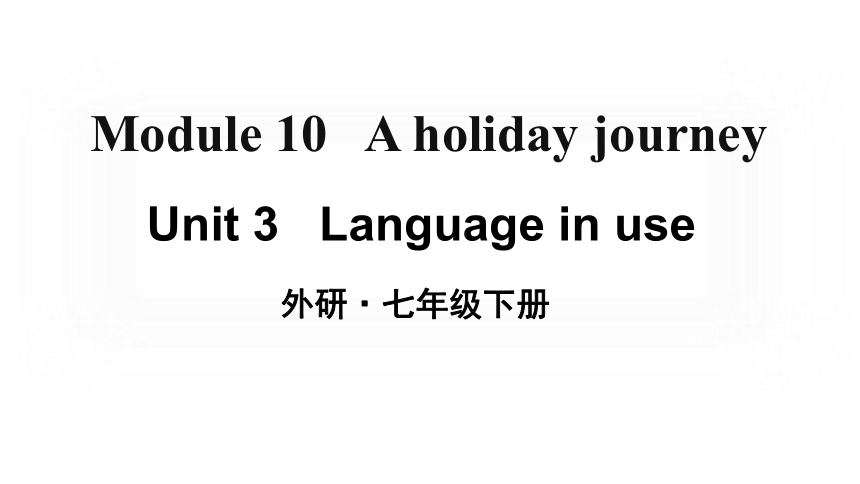
|
|
| 格式 | ppt | ||
| 文件大小 | 5.0MB | ||
| 资源类型 | 教案 | ||
| 版本资源 | 外研版 | ||
| 科目 | 英语 | ||
| 更新时间 | 2021-03-04 00:00:00 | ||
图片预览


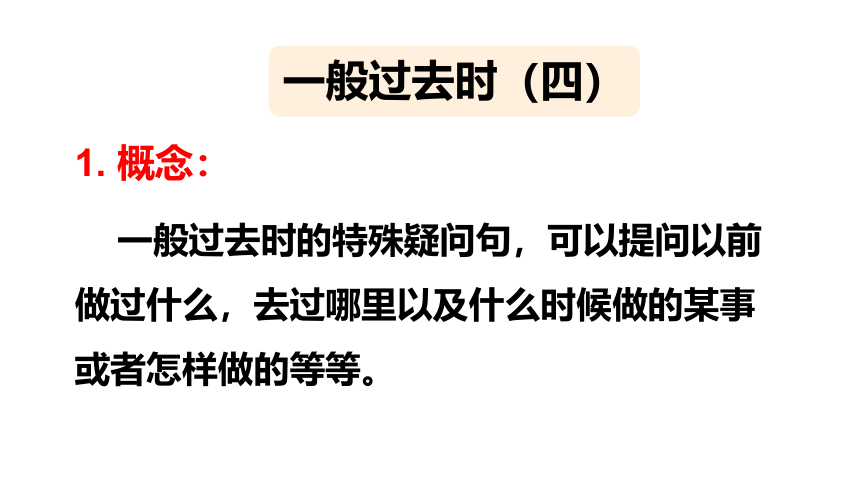
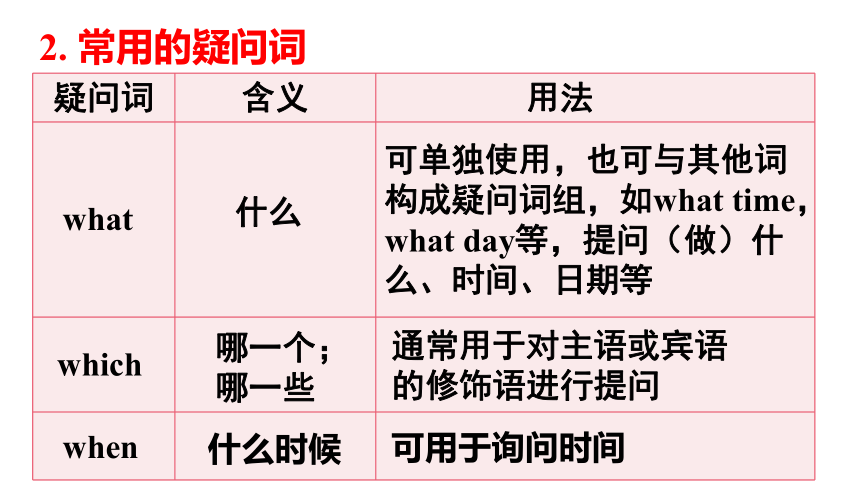
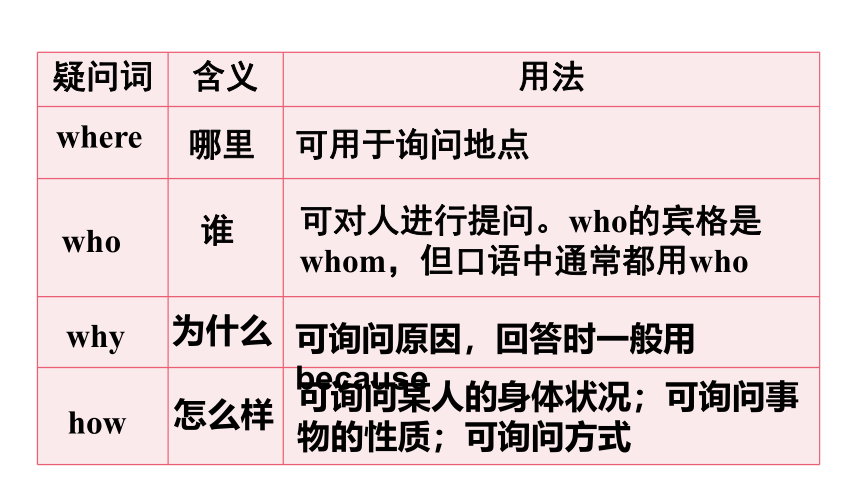
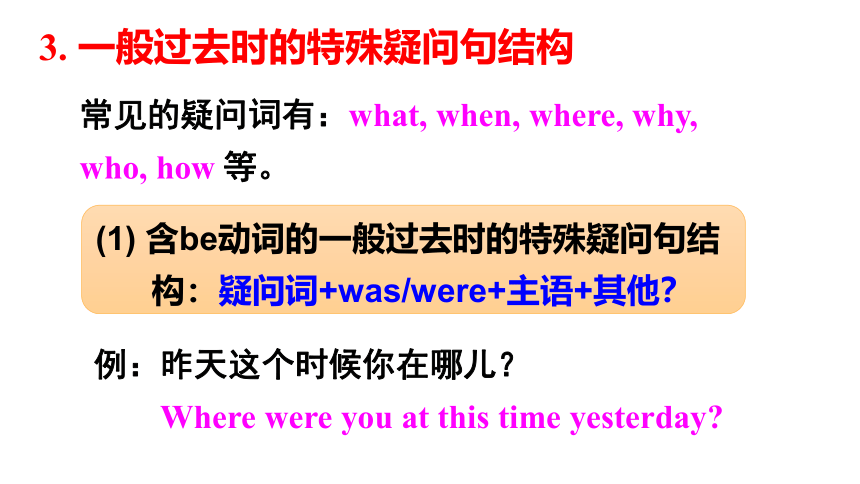
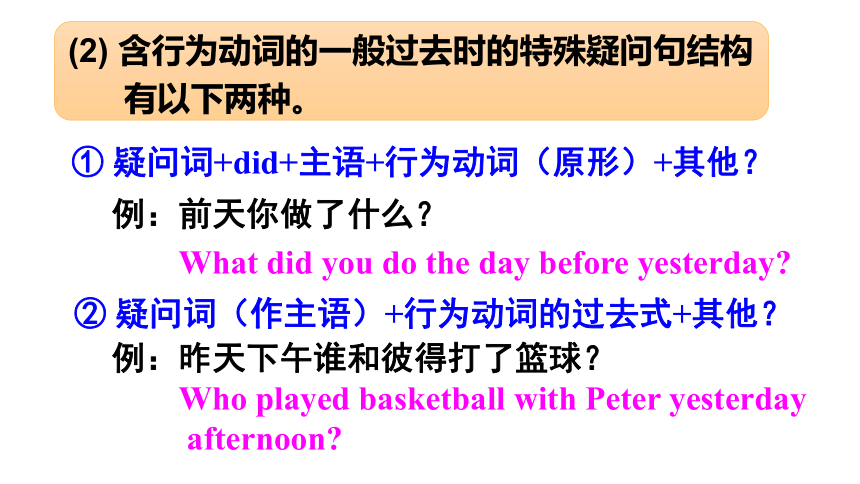
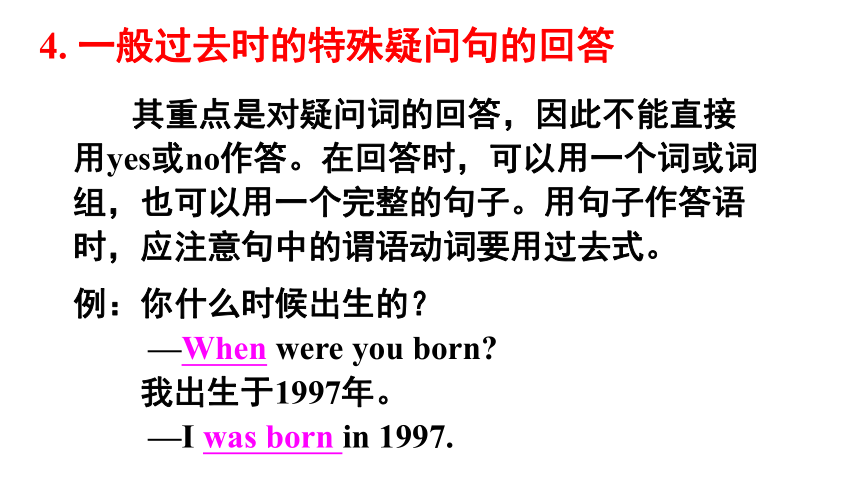

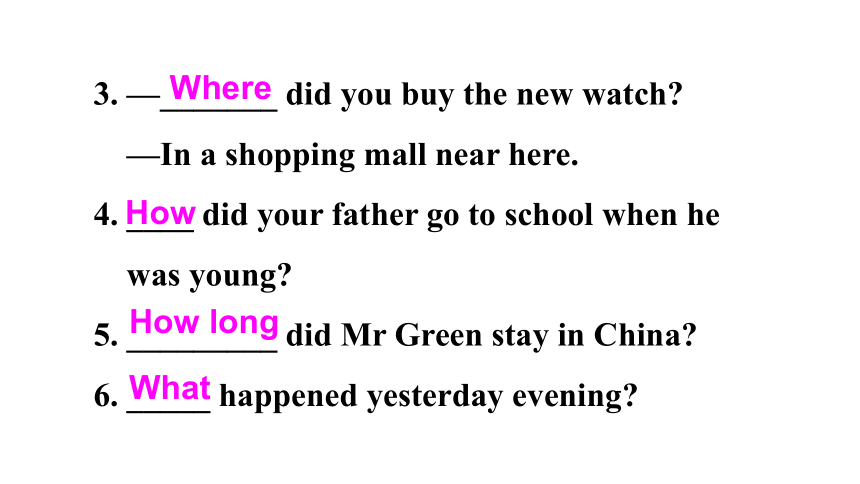


文档简介
外研·七年级下册
Unit 3 Language in use
Module 10 A holiday journey
Language practice
Who was with you?
What did you do?
How long did it take to get there?
一般过去时的特殊疑问句
一般过去时的特殊疑问句,可以提问以前做过什么,去过哪里以及什么时候做的某事或者怎样做的等等。
1. 概念:
一般过去时(四)
疑问词
含义
用法
2. 常用的疑问词
什么时候
可单独使用,也可与其他词
构成疑问词组,如what time,
what day等,提问(做)什
么、时间、日期等
通常用于对主语或宾语的修饰语进行提问
哪一个;哪一些
什么
可用于询问时间
which
what
when
疑问词
含义
用法
怎么样
可用于询问地点
可对人进行提问。who的宾格是whom,但口语中通常都用who
谁
哪里
可询问原因,回答时一般用because
who
where
why
how
为什么
可询问某人的身体状况;可询问事物的性质;可询问方式
3. 一般过去时的特殊疑问句结构
常见的疑问词有:what, when, where, why, who, how 等。
(1) 含be动词的一般过去时的特殊疑问句结
构:疑问词+was/were+主语+其他?
例:昨天这个时候你在哪儿?
Where were you at this time yesterday?
(2) 含行为动词的一般过去时的特殊疑问句结构
有以下两种。
② 疑问词(作主语)+行为动词的过去式+其他?
① 疑问词+did+主语+行为动词(原形)+其他?
例:前天你做了什么?
What did you do the day before yesterday?
例:昨天下午谁和彼得打了篮球?
Who played basketball with Peter yesterday
afternoon?
4. 一般过去时的特殊疑问句的回答
其重点是对疑问词的回答,因此不能直接用yes或no作答。在回答时,可以用一个词或词组,也可以用一个完整的句子。用句子作答语时,应注意句中的谓语动词要用过去式。
例:你什么时候出生的?
—When were you born?
我出生于1997年。
—I was born in 1997.
一、选用适当的疑问词填空。
where what how when
how long how much
1. —______ did you start to learn to skate?
—Five years ago.
2. —___________ does the coat cost?
—Fifty yuan.
How much
When
即时演练
3. —_______ did you buy the new watch?
—In a shopping mall near here.
4. ____ did your father go to school when he
was young?
5. _________ did Mr Green stay in China?
6. _____ happened yesterday evening?
How
Where
How long
What
二、单项选择。
1. —_______ did they go to Hainan Island?
—They went there by train.
A. Who B. When C. How D. Where
2. —_______ did the concert last?
—For five hours.
A. How old B. How far
C. How long D. How often
3. —_______ did you do yesterday?
—We played tennis.
A. Who B. What C. Why D. When
4. —_______ didn’t you come to the meeting
yesterday?
—Because I had a bad cold.
A. Where B. When C. Why D. How
Work in pairs. Ask and answer questions about your holidays. Use the expressions from the box to help you.
by plane/train do shopping
meet... at the airport/station spend all day
1. who / go with?
2. when / go?
3. how / go?
4. who / meet?
5. what / do?
6. how long / stay?
Where/go?
Where did you go on holiday?
I went to…
Who did you go with?
I went with my parents.
When did you go?
Last month.
Work in pairs
How did you go?
By train.
Who did you meet?
I met my father’s classmate.
What did you do?
I bought some presents.
How long did you stay?
I stayed for a week.
Write the questions and your partner’s answers.
— Where did you go on holiday?
— I went to Hainan.
Possible answers
1. —Who?did?you?go?with?
—I?went?with?my?grandparents.
2. —When?did?you?go?
—I?went?there?last?summer.
3. —How?did?you?get?there?
—I?got?there?by?air.
4. —Who?did?you?meet?
—I?met?Liu?Xiang.
5. —What?did?you?do?
—I went?swimming?in?the?sea.
6. —How long did you stay?
—I stayed for about two weeks.
Work with a new partner. Ask and
answer questions about your first partner.
— Where did... go on holiday?
— He / She went to Hainan.
Complete the postcard with the correct form of the words from the box.
go have swim take visit write
Hi Mum,
I’m (1) ______ a really good time. I’m (2) _______ this postcard at the airport.
having
writing
We were at the hotel for four days. We (3) ______ in the sea, (4) ________ some museums and (5) ______ lots of photos. We also (6) ______ shopping.
See you soon.
Lots of love,
Betty
swam
visited
took
went
Choose the correct answer.
1 Today is Wednesday, so yesterday / tomorrow
was Tuesday.
2 I was there last / next week.
3 I’m going to travel around the world many years
ago / in the future.
4 They’re eating at a great restaurant right now /
soon.
5 The palace was not open in 1995 / 2103.
Write six things you did on your last holiday.
On my last holiday, I bought some
presents for my friends.
1 _______________________________
I bought a T-shirt for my father.
2 _______________________________
I swam in the sea.
3 _______________________________
I took some photos.
4 _______________________________
I saw some animals.
5 _______________________________
l went for a picnic.
6 _______________________________
l saw a famous building.
Around the world
Tourists like to do different things on holiday. Some like to learn about the places they see, some like to take photos of themselves in the places they visit, and some just like to take photos of the interesting things they see.
An interesting holiday
Module task: Writing an email to a friend about your holiday
Work in pair. Ask and answer the questions about your last holiday.
— Where did you go?
— To...
— Who did you go with?
— My family.
1 How long did you stay?
2 How did you get there?
3 Where did you stay?
4 What did you do?
Write your answers to the questions in Activity 7.
I went to... I went with...
1 How long did you stay?
A week.
2 How did you get there?
By plane.
3 Where did you stay?
Hotel.
4 What did you do?
Take pictures, go shopping.
Write an email to your friend about your holiday.
Dear...
On my last holiday, I...
Possible?answer
Hi Daniel,
I?had?a?really?good?time?on?my?last?holiday. The?weather was?great?and?there?were?lots of?interesting?things?to?do. I?swam?in?the?sea every?morning.?In?the?afternoons, I?went shopping?or?visited?the?museums.
The?food was?delicious. I?bought?some
presents?for my family?and friends.?It was?so?great!?What about?your?last holiday?
Hope?to?hear?from?you?soon!
Yours,
Tammy
Language points
1. spend?all?day 花费一整天
all 形容词,意为“全部的,所有的”,常作定语。all day 意为“一整天”。
例:所有的乘客都得救了。
All?the?passengers?were?saved.
例:天气是如此热,以至于他们都去游泳了。
It?was?so?hot?that?they?all?went?swimming.
珍妮是如此聪明的女孩,我们所有人都喜欢她。
Jenny is such a clever girl that all of us like her.
all 还可用作代词,意为“全部;全体”。
all?of... 意为“……的全部”。
【拓展】
2. We swam?in?the?sea, visited some museums
and took?lots?of?photos.
take?photos 意为“拍照片”。
take?a?photo 表示“拍一张照片”
take?photos/?a?photo?of...“拍……的照片”。
例:凯特喜欢拍照片。
Kate?enjoys?taking?photos.
他的叔叔拍了一张树的照片。
His?uncle?took?a?photo?of?trees.
中考?链接 (天津)
根据所给中文意思完成句子,每空限填一词。
他拿出相机开始拍照。
He?took?out?his?camera?and?started?to
____ ______.
take photos
3. They’re?eating?at?a?great?restaurant?right
now/soon.
right?now 意为“现在;此刻”,常用于现在进行时态的句子中。
例:现在他们正在开会。
They’re?having?a?meeting?right?now.
一、单项选择。
1. Let’s take some _______.
A. photo B. photos
C. photoes D. picture
2. Hurry up! If we miss ______ last plane, we’ll
have to get home by _______ train.
A. a, / B. the, a C. the, / D. a, a
Exercise
3. They _______ the Great Wall yesterday, and
this is their first ______ the Great Wall.
A. visited, visit to B. visit, visit
C. visit, visit to D. visited, visit
4. They’re having an English lesson _______.
A. right now B. right away
C. at once D. just right
Unit 3 Language in use
Module 10 A holiday journey
Language practice
Who was with you?
What did you do?
How long did it take to get there?
一般过去时的特殊疑问句
一般过去时的特殊疑问句,可以提问以前做过什么,去过哪里以及什么时候做的某事或者怎样做的等等。
1. 概念:
一般过去时(四)
疑问词
含义
用法
2. 常用的疑问词
什么时候
可单独使用,也可与其他词
构成疑问词组,如what time,
what day等,提问(做)什
么、时间、日期等
通常用于对主语或宾语的修饰语进行提问
哪一个;哪一些
什么
可用于询问时间
which
what
when
疑问词
含义
用法
怎么样
可用于询问地点
可对人进行提问。who的宾格是whom,但口语中通常都用who
谁
哪里
可询问原因,回答时一般用because
who
where
why
how
为什么
可询问某人的身体状况;可询问事物的性质;可询问方式
3. 一般过去时的特殊疑问句结构
常见的疑问词有:what, when, where, why, who, how 等。
(1) 含be动词的一般过去时的特殊疑问句结
构:疑问词+was/were+主语+其他?
例:昨天这个时候你在哪儿?
Where were you at this time yesterday?
(2) 含行为动词的一般过去时的特殊疑问句结构
有以下两种。
② 疑问词(作主语)+行为动词的过去式+其他?
① 疑问词+did+主语+行为动词(原形)+其他?
例:前天你做了什么?
What did you do the day before yesterday?
例:昨天下午谁和彼得打了篮球?
Who played basketball with Peter yesterday
afternoon?
4. 一般过去时的特殊疑问句的回答
其重点是对疑问词的回答,因此不能直接用yes或no作答。在回答时,可以用一个词或词组,也可以用一个完整的句子。用句子作答语时,应注意句中的谓语动词要用过去式。
例:你什么时候出生的?
—When were you born?
我出生于1997年。
—I was born in 1997.
一、选用适当的疑问词填空。
where what how when
how long how much
1. —______ did you start to learn to skate?
—Five years ago.
2. —___________ does the coat cost?
—Fifty yuan.
How much
When
即时演练
3. —_______ did you buy the new watch?
—In a shopping mall near here.
4. ____ did your father go to school when he
was young?
5. _________ did Mr Green stay in China?
6. _____ happened yesterday evening?
How
Where
How long
What
二、单项选择。
1. —_______ did they go to Hainan Island?
—They went there by train.
A. Who B. When C. How D. Where
2. —_______ did the concert last?
—For five hours.
A. How old B. How far
C. How long D. How often
3. —_______ did you do yesterday?
—We played tennis.
A. Who B. What C. Why D. When
4. —_______ didn’t you come to the meeting
yesterday?
—Because I had a bad cold.
A. Where B. When C. Why D. How
Work in pairs. Ask and answer questions about your holidays. Use the expressions from the box to help you.
by plane/train do shopping
meet... at the airport/station spend all day
1. who / go with?
2. when / go?
3. how / go?
4. who / meet?
5. what / do?
6. how long / stay?
Where/go?
Where did you go on holiday?
I went to…
Who did you go with?
I went with my parents.
When did you go?
Last month.
Work in pairs
How did you go?
By train.
Who did you meet?
I met my father’s classmate.
What did you do?
I bought some presents.
How long did you stay?
I stayed for a week.
Write the questions and your partner’s answers.
— Where did you go on holiday?
— I went to Hainan.
Possible answers
1. —Who?did?you?go?with?
—I?went?with?my?grandparents.
2. —When?did?you?go?
—I?went?there?last?summer.
3. —How?did?you?get?there?
—I?got?there?by?air.
4. —Who?did?you?meet?
—I?met?Liu?Xiang.
5. —What?did?you?do?
—I went?swimming?in?the?sea.
6. —How long did you stay?
—I stayed for about two weeks.
Work with a new partner. Ask and
answer questions about your first partner.
— Where did... go on holiday?
— He / She went to Hainan.
Complete the postcard with the correct form of the words from the box.
go have swim take visit write
Hi Mum,
I’m (1) ______ a really good time. I’m (2) _______ this postcard at the airport.
having
writing
We were at the hotel for four days. We (3) ______ in the sea, (4) ________ some museums and (5) ______ lots of photos. We also (6) ______ shopping.
See you soon.
Lots of love,
Betty
swam
visited
took
went
Choose the correct answer.
1 Today is Wednesday, so yesterday / tomorrow
was Tuesday.
2 I was there last / next week.
3 I’m going to travel around the world many years
ago / in the future.
4 They’re eating at a great restaurant right now /
soon.
5 The palace was not open in 1995 / 2103.
Write six things you did on your last holiday.
On my last holiday, I bought some
presents for my friends.
1 _______________________________
I bought a T-shirt for my father.
2 _______________________________
I swam in the sea.
3 _______________________________
I took some photos.
4 _______________________________
I saw some animals.
5 _______________________________
l went for a picnic.
6 _______________________________
l saw a famous building.
Around the world
Tourists like to do different things on holiday. Some like to learn about the places they see, some like to take photos of themselves in the places they visit, and some just like to take photos of the interesting things they see.
An interesting holiday
Module task: Writing an email to a friend about your holiday
Work in pair. Ask and answer the questions about your last holiday.
— Where did you go?
— To...
— Who did you go with?
— My family.
1 How long did you stay?
2 How did you get there?
3 Where did you stay?
4 What did you do?
Write your answers to the questions in Activity 7.
I went to... I went with...
1 How long did you stay?
A week.
2 How did you get there?
By plane.
3 Where did you stay?
Hotel.
4 What did you do?
Take pictures, go shopping.
Write an email to your friend about your holiday.
Dear...
On my last holiday, I...
Possible?answer
Hi Daniel,
I?had?a?really?good?time?on?my?last?holiday. The?weather was?great?and?there?were?lots of?interesting?things?to?do. I?swam?in?the?sea every?morning.?In?the?afternoons, I?went shopping?or?visited?the?museums.
The?food was?delicious. I?bought?some
presents?for my family?and friends.?It was?so?great!?What about?your?last holiday?
Hope?to?hear?from?you?soon!
Yours,
Tammy
Language points
1. spend?all?day 花费一整天
all 形容词,意为“全部的,所有的”,常作定语。all day 意为“一整天”。
例:所有的乘客都得救了。
All?the?passengers?were?saved.
例:天气是如此热,以至于他们都去游泳了。
It?was?so?hot?that?they?all?went?swimming.
珍妮是如此聪明的女孩,我们所有人都喜欢她。
Jenny is such a clever girl that all of us like her.
all 还可用作代词,意为“全部;全体”。
all?of... 意为“……的全部”。
【拓展】
2. We swam?in?the?sea, visited some museums
and took?lots?of?photos.
take?photos 意为“拍照片”。
take?a?photo 表示“拍一张照片”
take?photos/?a?photo?of...“拍……的照片”。
例:凯特喜欢拍照片。
Kate?enjoys?taking?photos.
他的叔叔拍了一张树的照片。
His?uncle?took?a?photo?of?trees.
中考?链接 (天津)
根据所给中文意思完成句子,每空限填一词。
他拿出相机开始拍照。
He?took?out?his?camera?and?started?to
____ ______.
take photos
3. They’re?eating?at?a?great?restaurant?right
now/soon.
right?now 意为“现在;此刻”,常用于现在进行时态的句子中。
例:现在他们正在开会。
They’re?having?a?meeting?right?now.
一、单项选择。
1. Let’s take some _______.
A. photo B. photos
C. photoes D. picture
2. Hurry up! If we miss ______ last plane, we’ll
have to get home by _______ train.
A. a, / B. the, a C. the, / D. a, a
Exercise
3. They _______ the Great Wall yesterday, and
this is their first ______ the Great Wall.
A. visited, visit to B. visit, visit
C. visit, visit to D. visited, visit
4. They’re having an English lesson _______.
A. right now B. right away
C. at once D. just right
同课章节目录
- Module 1 Lost and found
- Unit 1 Whose bag is this?
- Unit 2 Are they yours?
- Unit 3 Language in use
- Module 2 What can you do ?
- Unit 1 I can play the piano
- Unit 2 I can run really fast
- Unit 3 Language in use
- Module 3 Making plans
- Unit 1 What are you going to do at the weekends?
- Unit 2 We're going to cheer the players.
- Unit 3 Language in use
- Module 4 Life in the future
- Unit 1 Everyone will study at home
- Unit 2 Every family will have a small plane.
- Unit 3 Language in use
- Module 5 Shopping
- Unit 1 What can I do for you?
- Unit 2 You can buy everything on the Internet
- Unit 3 Language in use
- Module 6 Around town
- Unit 1 Could you tell me how to get to the Nationa
- Unit 2 The London Eye is on your right.
- Unit 3 Language in use
- Revision module A
- Module 7 My past life
- Unit 1 I was born in a small village.
- Unit 2 I was born in Quincy.
- Unit 3 Language in use
- Module 8 Story time
- Unit 1 Once upon a time….
- Unit 2 Goldilocks hurried out of the house.
- Unit 3 Language in use
- Module 9 Life history
- Unit 1 He left school and began work at the age of
- Unit 2 He decided to be an actor.
- Unit 3 Language in use
- Module 10 A holiday journey
- Unit 1 What did you do?
- Unit 2 This morning we took a walk.
- Unit 3 Language in use
- Module 11 Body language
- Unit 1 They touch noses!
- Unit 2 Here are some ways to welcome them.
- Unit 3 Language in use
- Module 12 Western music
- Unit 1 It's so beautiful!
- Unit 2 Vienna is the centre of European classical
- Unit 3 Language in use
- Revision module B
